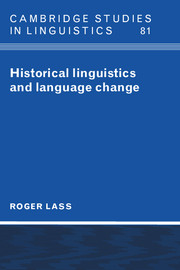Book contents
- Frontmatter
- Contents
- Preface
- Conventions, abbreviations and symbols
- General prologue: time travel and signal processing
- 1 The past, the present and the historian
- 2 Written records: evidence and argument
- 3 Relatedness, ancestry and comparison
- 4 Convergence and contact
- 5 The nature of reconstruction
- 6 Time and change: the shape(s) of history
- 7 Explanation and ontology
- References
- Index of names
- Subject index
7 - Explanation and ontology
Published online by Cambridge University Press: 05 June 2012
- Frontmatter
- Contents
- Preface
- Conventions, abbreviations and symbols
- General prologue: time travel and signal processing
- 1 The past, the present and the historian
- 2 Written records: evidence and argument
- 3 Relatedness, ancestry and comparison
- 4 Convergence and contact
- 5 The nature of reconstruction
- 6 Time and change: the shape(s) of history
- 7 Explanation and ontology
- References
- Index of names
- Subject index
Summary
Felix qui potuit rerum cognoscere causas
(Lucretius, De rerum natura)Our ability to perform apparently random, motiveless acts is undeniable – but only if they are done with some purpose or other in mind do they count as acts in the first place. Someone who kicks the cat while having an epileptic fit is not only not acting freely: their kicks were not actions at all.
(Margaret Boden, The creative mind)The issues
Conceptual preliminaries
People have tried to explain why linguistic change should occur ever since they first became aware of it. There are two major sub-issues: (a) why should any change at all occur? and (b) why should some particular observed (type of) change have occurred? Question (a) at present has no agreed-on technical answer (though of course there are lay pseudodoxia like the common belief that change is due to human sloppiness and refusal to read grammar-books). There is however an answer that is less trivial than it might seem to be at first, which is that change is a sublunary axiom. If as Heraclitus is supposed to have said (see §6.1), everything is in flux and nothing stays still, why should language be exempt?
- Type
- Chapter
- Information
- Historical Linguistics and Language Change , pp. 325 - 390Publisher: Cambridge University PressPrint publication year: 1997
- 1
- Cited by



